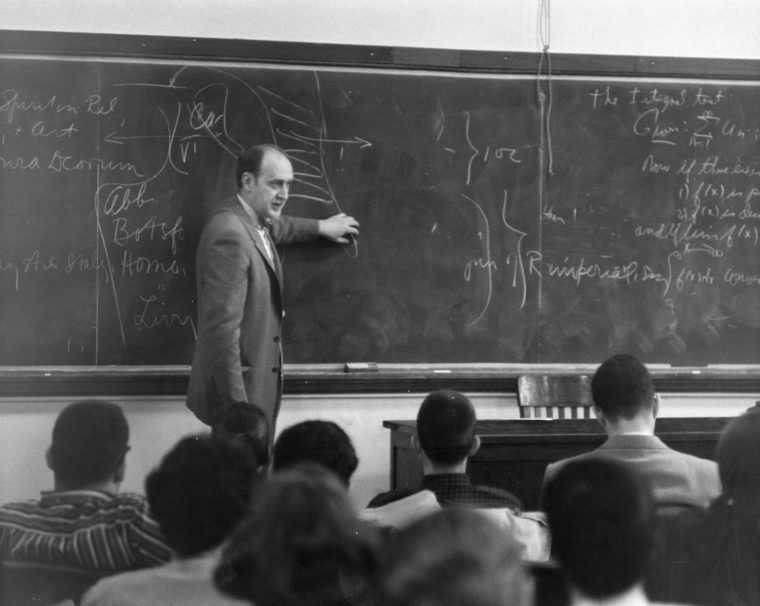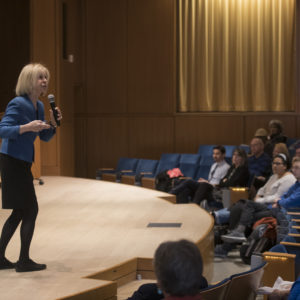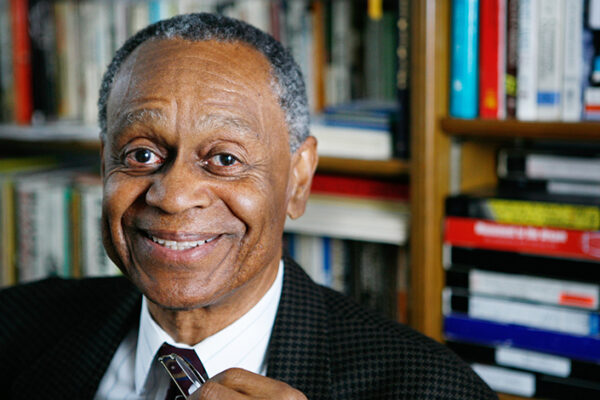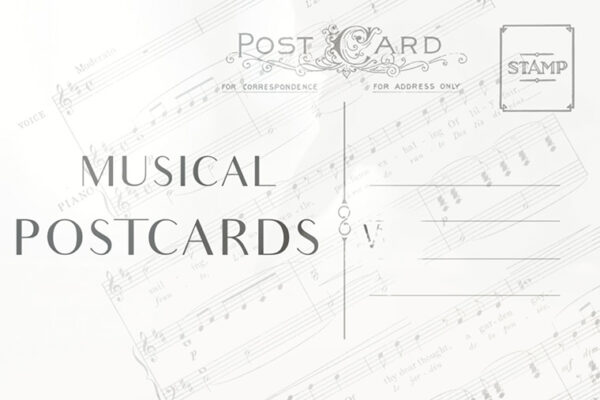Edward G. Weltin Sr. was a distinguished member of Washington University’s Department of History in Arts & Sciences for more than 30 years, and he served as director of the Religious Studies Program. He retired in 1980, but as professor emeritus of history, Weltin continued to teach University College courses well into his 80s. He died in 2002 at the age of 91.
First-person accounts by his students, as well as feature stories in local publications, clearly illustrate the popularity of his courses in ancient Greek and Roman history, Western civilization and early Christianity. Students loved his entertaining style and quick, acerbic wit, although his exams were described as “grueling.”
But perhaps the best testimony of Weltin’s influence on his pupils came from the late Cynthia DeHaven Pitcock, AB ’55. In the spring 2004 Washington magazine, Pitcock shared her reverence for Weltin in the issue’s “Lasting Lessons” section:
“[Edward G. Weltin] set me on my path toward an academic career a half-century ago. I was one of many students in history who received his faithful guidance, and I have always felt that I am required as a professor to pass on to students his concern and friendship. Dr. Weltin was a world-class scholar in ancient history; his teaching style was brilliant and humorous. He took his work very seriously, but not himself. His office in Busch Hall was a popular place for students — you couldn’t walk past his door without seeing a group in there. He never talked down to us. I believe he had genuine respect for his students.”
So beloved was he that a group of his former students, including Pitcock, decided to honor him by establishing an endowed lecture fund bearing his name.
His friend and colleague, the late Burton Wheeler, professor of English and also former director of religious studies, helped the group by writing a letter soliciting support for the fund. In it, he wrote the following:
“Our hope is that the fund will expand to a sufficient level that its interest can be used annually to bring to campus a distinguished scholar/teacher whose commitment to relating to students ‘The Genesis of Western Values’ (the title of one of his courses) matches that of Professor Weltin himself.”
Sarah O’Donnell, BFA ’02, didn’t know Weltin personally, but as the administrative assistant in religious studies for 10 years, and involved with the lecture’s implementation for 15 years, she’s the keeper of the program’s institutional memory, and she fondly remembers several Weltin scholars’ visits during her tenure.
“Every lecture I’ve been involved with has been stimulating and thought-provoking,” O’Donnell said. “The speakers have delivered great talks, and they have been generous with their time while on campus, interacting with our students and faculty.”
She agrees with Maffly-Kipp regarding the relevance of studying religion today.
“The field of religious studies is not confined to traditional humanities subjects, like history and philosophy; it touches on any subject that deals with humanistic inquiry,” O’Donnell said. “It doesn’t present a narrow focus; it’s the opposite. The study of religion has wide-ranging professional applications for careers in business, medicine, law, art and many others.”
The subject of religion continues to impact Washington University students’ academic decisions and inspires them to think critically about the world, just as it did in Weltin’s era. The Weltin Fund allows for an intellectual exchange that can turn a one-hour lecture into an enriching experience offering multiple encounters and insights.
That’s exactly what happened when Viktoria Ohstrom, Arts & Sciences Class of ’21, met Elaine Pagels at a luncheon the day of her Weltin Lecture.
In addition to arranging several meetings with faculty, Maffly-Kipp hosted a small luncheon at the Whittemore House for Pagels to meet a group of undergraduates. One of Lance Jenott’s students, Ohstrom is a physics major, engrossed in learning about cosmology and astrophysics.
“But in the fall 2017 semester, I took a religious studies course with Professor Jenott and loved it, much more than I expected to, and I decided to take another one,” Ohstrom said. “In talking to him about my interests, he asked me if I had ever considered minoring in religious studies.
“He said, ‘You need to talk with Dr. Pagels.’ And he was right,” Ohstrom said. “Before the lunch, I had been leaning toward adding a religious studies minor, but the luncheon encounter sealed the deal.”
Ohstrom cited a particularly relevant discussion with Pagels about the need to use both the sciences and the humanities to understand the world.
“Even though they are very divergent fields of study, they are both important ways of approaching the world,” Ohstrom said.
It’s safe to bet that Professor Weltin would have whole-heartedly agreed with Ohstrom’s statement. It’s an even safer bet that his students would be very happy to know their efforts, and their donations, continue to pay untold scholarly dividends.




